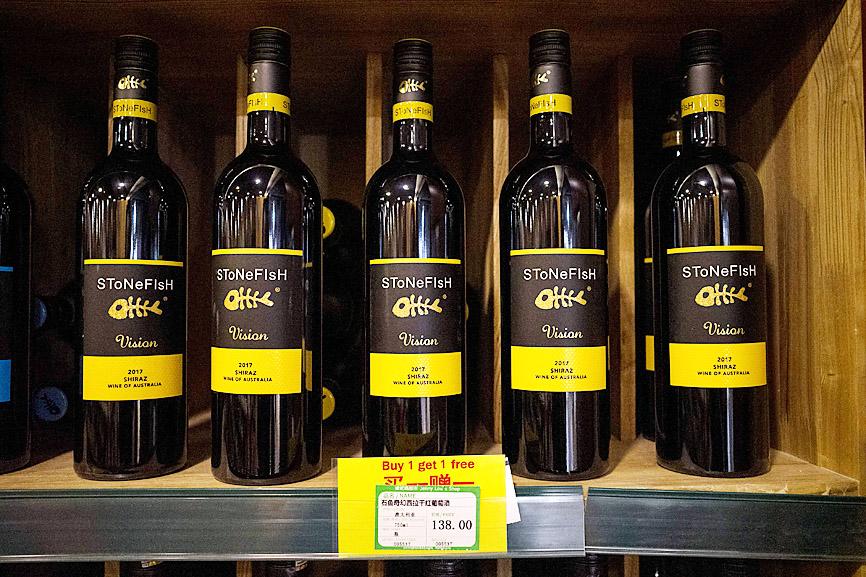China yesterday launched a probe into wine imports from Australia, the latest salvo in a row between the trade partners.
Relations between Beijing and Canberra have nosedived in recent months after Australian Prime Minister Scott Morrison joined US calls for an independent inquiry into the COVID-19 pandemic, which was first detected in the Chinese city of Wuhan last year.
China, Australia’s biggest trade partner, has since threatened economic blowback on a range of Australian goods, including beef and barley, as well as tourism and higher education.

Photo: AFP
The Chinese Ministry of Commerce said in a statement that it would investigate dumping — when a country sells goods in a country for less than it costs at home — throughout last year, at the request of the Wine Industry Association of China.
Wine exports to China hit a record A$1.25 billion (US$900 million) last year, according to Australian government data, making it the biggest market by value for the product.
Australia said it would work with local wine producers to defend the industry against the claims, saying it was second only to New Zealand as the least-subsidized globally.
“While we respect the right of any nation to defend their domestic producers from unfair and uncompetitive trade practices, we reject any claim that Australian wine product has been ‘dumped’ into China,” Australian Minister for Agriculture, Drought and Emergency Management David Littleproud said in a statement.
Chinese Ambassador to Australia Cheng Jingye (成競業) in April said that Beijing could take such measures.
“The Chinese public is frustrated, dismayed and disappointed with what Australia is doing now,” Cheng told the Australian Financial Review.
“Maybe the ordinary people will say: ‘Why should we drink Australian wine? Eat Australian beef?’” he said.
In May, China suspended imports of beef from four Australian slaughterhouses and imposed 80 percent tariffs on Australian barley imports.
Beijing has also warned Chinese citizens not to visit Australia for study or tourism purposes, alleging anti-Asian racism in the wake of the pandemic.
The moves are widely seen as retaliation for Canberra’s calls for an independent investigation into the origin of the coronavirus.
The two countries were already at loggerheads after Australia hit China with anti-dumping levies on several products.

Taiwan Semiconductor Manufacturing Co (TSMC, 台積電) halted shipments to a customer this month after its semiconductors were sent to China’s Huawei Technologies Co (華為), potentially breaching US sanctions, a government official said. The US slapped sanctions on Huawei in 2019, and expanded them the following year, over fears its technology could be used for Beijing’s espionage operations. The restrictions prevent TSMC from selling semiconductors to Huawei. However, TSMC discovered on Oct. 11 that chips made for a “specific customer” had ended up with the Chinese company, a Taiwanese official with knowledge of the incident said on the condition of anonymity. TSMC “immediately activated

US SANCTIONS: The Taiwan tech giant has ended all shipments to China-based Sophgo Technologies after one of their chips was discovered in a Huawei phone Taiwan Semiconductor Manufacturing Co (TSMC, 台積電) suspended shipments to China-based chip designer Sophgo Technologies Ltd (算能科技) after a chip it made was found on a Huawei Technologies Co (華為) artificial intelligence (AI) processor, according to two people familiar with the matter. Sophgo had ordered chips from TSMC that matched the one found on Huawei’s Ascend 910B, the people said. Huawei is restricted from buying the technology to protect US national security. Reuters could not determine how the chip ended up on the Huawei product. Sophgo said in a statement on its Web site yesterday that it was in compliance with all laws

TECH TITANS: Nvidia briefly overtook Apple again on Friday after becoming the world’s largest company for a short period in June, as Microsoft fell to third place Nvidia Corp dethroned Apple Inc as the world’s most valuable company on Friday following a record-setting rally in the stock, powered by insatiable demand for its specialized artificial intelligence (AI) chips. Nvidia’s stock market value briefly touched US$3.53 trillion, slightly above Apple’s US$3.52 trillion, London Stock Exchange Group data showed. Nvidia ended the day up 0.8 percent, with a market value of US$3.47 trillion, while Apple’s shares rose 0.4 percent, valuing the iPhone maker at US$3.52 trillion. In June, Nvidia briefly became the world’s most valuable company before it was overtaken by Microsoft Corp and Apple. The tech trio’s market capitalizations have been

Shares of Starlux Airlines Co (星宇航空) surged more than 53 percent on its debut on the Taiwan stock exchange yesterday. Starlux shares closed up 53.75 percent at NT$30.75 from its initial public offering price of NT$20 after retreating in late trading from a 60 percent rise. China Airlines Ltd (CAL, 中華航空) rose 0.90 percent to close at NT$22.35, while EVA Airways Corp (長榮航空) gained 0.40 percent to close at NT$37.70. In Taiwan, a newly listed stock is allowed to go beyond the 10 percent maximum increase or decline in its first five trading sessions. At the listing ceremony, Starlux chairman Chang Kuo-wei (張國煒) said